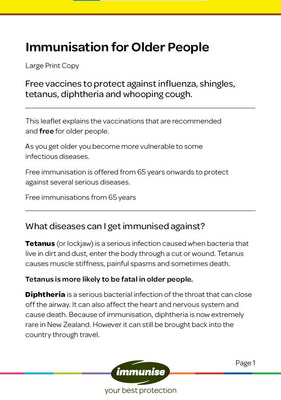Immunisation for Older People - Large text format - HE2548

Leaflet in downloadable large text format for older people giving information about free vaccines to protect against influenza, shingles, tetanus and diphtheria. This leaflet is also available to order in printed format: HE2540 Immunisation for Older People.
The full resource:
This leaflet is also available to order in printed format: Immunisation for Older People.
This leaflet explains the vaccinations that are recommended and free for older people.
As you get older you become more vulnerable to some infectious diseases.
Free immunisation is offered from 65 years onwards to protect against several serious diseases.
Free immunisations from 65 years
What diseases can I get immunised against?
Tetanus (or lockjaw) is a serious infection caused when bacteria that live in dirt and dust, enter the body through a cut or wound. Tetanus causes muscle stiffness, painful spasms and sometimes death.
Tetanus is more likely to be fatal in older people.
Diphtheria is a serious bacterial infection of the throat that can close off the airway. It can also affect the heart and nervous system and cause death. Because of immunisation, diphtheria is now extremely rare in New Zealand. However it can still be brought back into the country through travel.
Pertussis (whooping cough) is a serious infection that can cause coughing and choking, making it hard to breathe. It can last for up to 10 weeks and some people will need hospital care. This disease is most serious in infants, so it is important to be immunised if you are likely to spend time with babies, young children or young grandchildren.
The combined tetanus, diphtheria and whooping cough vaccine is free and recommended when you reach the age of 45, if you haven’t previously had four doses of tetanus vaccine. It is also free and recommended at the age of 65 years to boost the immunity you received as a child.
Influenza (or flu) is a serious illness that can sometimes be fatal. People of any age who contract the flu can end up in hospital, but it’s more likely if you’re older or have an underlying medical condition. Influenza can make an existing medical condition, such as asthma, emphysema or diabetes, a lot worse.
Every year around 500 New Zealanders die from influenza.
Influenza vaccine is free and recommended every year from age 65 years onwards.
The vaccine cannot give you the flu. Every year, the influenza vaccine is adjusted to protect against strains of the influenza virus that are most likely to be circulating the following winter, as these change from year to year. The vaccine is usually given in late autumn, before the disease reaches its winter peak, but is available from autumn until the end of the year.
Shingles (or herpes zoster) is a painful rash affecting a particular nerve. It‘s a long-term effect of chickenpox that can occur many years after a person has recovered from the initial disease. It can affect anyone who has previously had chickenpox, and is more common in older people. Shingles usually lasts 10 to 15 days but can cause scarring and loss of vision if it affects the eyes.
One of the most serious complications, particularly among older people, is nerve pain that lasts long after the rash has disappeared.
Shingles vaccine is free at age 65 years.
Adults younger than 65 years may be eligible for free immunisation against influenza and other diseases if they have serious health conditions that put them at greater risk of illness. Talk to your doctor if you think this might apply to you.
How effective are the vaccines?
Immunisation significantly reduces the chance that you will catch these diseases, but does not provide total protection against any disease, including influenza and shingles. Immunisation is strongly recommended by health professionals as it may still reduce the severity of the disease.
Although the effectiveness of immunisation reduces as we get older (because our immune systems become less effective at fighting disease with age), immunisation is still one of the best ways to help protect against several serious diseases.
Where do I get immunised?
Free immunisation against these diseases is available at your local medical or health centre, and at many pharmacies.
Are there any common reactions to the vaccines?
After an injection, you may get a sore arm or mild fever for a day or two. About one in every 100,000 combined tetanus, diphtheria and whooping cough vaccinations may result in damage to the nerves of the arm.
Very rarely – about one in a million times, a person might experience a serious allergic reaction (anaphylaxis) shortly after vaccination. You will be asked to wait at the clinic or surgery for 20 minutes after a vaccine is given. This is to make sure that medical treatment is available if a serious allergic reaction occurs.
There is no evidence for other serious risks.
It’s safe to receive all three vaccines on the same day.
Contact your doctor, practice nurse or vaccinating pharmacist if you experience any unusual or severe symptoms after immunisation.
Receiving all three vaccines on the same day is as safe and effective as receiving them separately.
4 Key Points
- As you get older, the protection from earlier immunisations can begin to wear off
- Free immunisations from 65+
- Protect against influenza, shingles, tetanus, diphtheria and whooping cough
- It’s safe to receive all vaccines together
Where can I find out more?
To find out more about immunisation and the diseases it can prevent:
- talk to your doctor, nurse, pharmacist or other vaccinator
- call Healthline 24/7 on 0800 611 116 or call 0800 IMMUNE (466 863) 9.00am to 4.30pm, Mon-Fri
- visit www.health.govt.nz/immunisation
- visit immune.org.nz